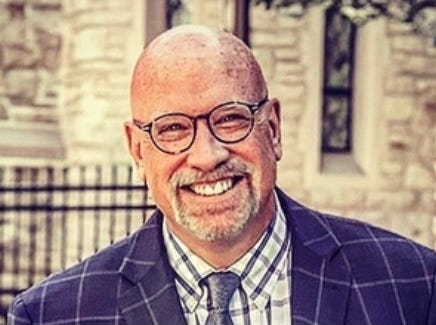In a culture increasingly paralyzed by outrage, despair, and victimhood, it is time we confront a fundamental spiritual and moral challenge: we must get off the tree of woe.
The phrase conjures a vivid image—one that resonates both biblically and metaphorically. For some, it may recall the haunting scene in Mel Gibson's The Passion of the Christ, where suffering is palpable, but Christ’s suffering is not one of mere victimhood. It is redemptive. Therein lies the key distinction. The tree of woe is not the Cross; it is its counterfeit. Where the Cross is chosen, purposeful, and transformative, the tree of woe is imposed, static, and corrosive. As Catholic theologians, ethicists, and practitioners in criminal justice, we must recognize this distinction, name it, and respond.
The Allure of Despair
Many in our society have become comfortable with woe. There is a twisted familiarity to it. It offers the illusion of moral clarity—"I suffer; therefore I am good. You have caused it; therefore you are evil." It is a posture that absolves one of responsibility and stifles personal agency. This is not the way of Christ.
St. Paul reminds us in Romans 5:3-5 that we "rejoice in our sufferings, knowing that suffering produces endurance, and endurance produces character, and character produces hope." The end of the Christian journey is not despair, but hope. Despair, when embraced as identity, becomes a form of acedia—a spiritual sloth that shrinks from the demands of love, virtue, and redemption.
The Catechism (CCC 618) teaches us that by uniting our sufferings with Christ, we participate in His redemptive work. This requires movement, intention, and faith. Remaining on the tree of woe is a refusal of this invitation.
Woe as Acedia: The Sin of Indifference
Thomas Aquinas classifies acedia as a vice contrary to the joy that comes from God. It is not merely laziness; it is a resistance to the demands of God's love. In our era, acedia often manifests as a kind of passive despair or moral paralysis. We see it in a society content to critique rather than act, to blame rather than build, to suffer rather than serve.
The Book of Proverbs warns us, "Go to the ant, O sluggard; consider her ways, and be wise" (Prov. 6:6). This scriptural admonition is not merely about work ethic; it is about moral clarity and the urgency of mission. The tree of woe is a refuge for those unwilling to rise.
Healing Through Responsibility: A Criminological Perspective
From the lens of applied criminology, we observe a critical pattern: individuals and communities often remain trapped in cycles of trauma, crime, and despair because they have not been invited or empowered to take responsibility for healing. This is not to blame victims, but to recognize that true justice is not retributive alone; it is restorative.
The Church's social doctrine affirms that every person possesses inherent dignity and is capable of moral growth and reconciliation. The Compendium of the Social Doctrine of the Church (201-208) speaks of justice that restores, that seeks the common good, and that reconciles. Getting off the tree of woe means entering into this process of restoration with courage and humility.
Forgiveness, restitution, community rebuilding—these are hard paths. But they are holy paths. They are the way of the Cross, not the stagnation of woe.
The Culture of Victimhood
Contemporary culture increasingly elevates victimhood to a place of moral superiority. Entire identities are formed around grievance. Social media becomes a liturgical space for lament without repentance, for accusation without accountability. The tree of woe becomes a throne.
But Scripture and tradition tell a different story. Mary, the Mother of Sorrows, stood at the foot of the Cross. She did not seek vengeance. She did not demand recognition for her pain. She offered it. She united it with her Son’s redemptive act. This is the Christian posture: not the exaltation of victimhood, but the sanctification of suffering through self-giving love.
Faith and Family: The Antidote to Cultural Woe
If we are to rebuild our moral and spiritual foundations, we must begin with the family. The Catechism calls the family the "original cell of social life" (CCC 2207). It is within the family that we first learn to give and receive love, to forgive, to suffer, and to hope.
Yet the family is under siege. Economic pressures, cultural confusion, and moral relativism erode the bonds that sustain us. To get off the tree of woe, we must reclaim the family as a school of virtue. We must form fathers who lead with courage, mothers who nurture with wisdom, and children who grow in truth.
Formation is the key. Not merely education, but formation—the shaping of souls, the cultivation of conscience, the training in virtue. Our parishes, schools, and ministries must be laboratories of such formation. We cannot outsource the faith. We must embody it.
Prophetic Witness in a Time of Confusion
In 1 Kings 18:21, the prophet Elijah confronts the people: "How long will you go limping between two opinions? If the Lord is God, follow him." This is the prophetic challenge of our age. The Church must not be a voice of vague affirmation but of radical clarity.
To get off the tree of woe is to stand. It is to speak the truth in love. It is to confront injustice without succumbing to bitterness. It is to name sin without losing hope in the sinner.
The laity, especially, have a role in this prophetic mission. As the Catechism teaches (CCC 904-907), lay people are called to be leaven in the world, transforming culture from within. This is not the work of experts alone. It is the baptismal calling of every Christian.
Conclusion: A Call to Resurrection
The image of the tree of woe invites us to consider our position: are we nailed to a posture of despair, paralyzed by fear, bitterness, or grief? Or are we willing to descend, to walk toward the Cross—and beyond it, toward resurrection?
Christ did not remain on the Cross. He passed through death into life. He descended into hell to rescue the lost, and He rose again to lead us home. We are called to do the same.
Let us reject the sterile comfort of woe. Let us refuse the identity of grievance. Let us walk the hard road of redemption, where suffering is not idolized, but offered; where pain is not denied, but transformed.
This is our moment. This is our mission.
Get off the tree of woe.
Stand up.
Take up your cross.
Follow Him.
And live.
Welcome to the St Michael’s Group! In a world facing a decline in religious belief and an increase in moral confusion, the need to reignite our faith has never been more critical. Religion’s capacity to offer meaning, foster ethical behavior, and build cohesive communities is vital for countering the spread of spiritual apathy and the influence of evil. By renewing our commitment to faith, we can combat the forces that seek to divide and weaken us. Reigniting our faith lives, therefore, is not just a personal endeavor but a collective responsibility. It is essential for preserving the moral and spiritual fabric of our society, ensuring that love, compassion, and justice continue to be the guiding principles of human existence.
This is why I started the St. Michael’s Group Substack and Podcast. Join us today stmichaelsgroup.substack.com and let’s start a movement of reigniting faith, family, and formation back into our lives.
This is Dr. Currie Myers. I am an applied criminologist and criminal justice ethicist. I have been on faculty in the criminology department at Benedictine College for over 13 years and was a career law enforcement officer for 24 years. Most importantly I have a beautiful family. My wife and I have been married for 37 years, and we have five children and 10 grandchildren. You can view my work on applied criminology at drcurriemyers.substack.com. Have a great and blessed week and please subscribe and share this podcast with others. And more importantly, if you are struggling in life and need someone to talk to, we have a chat function that you can contact me directly.
If this episode moved you, I invite you to share it with someone you love. Let this be a holy conversation starter. And if you haven’t already, spend time in front of the Cross this weekend. Not to look at it, but to be changed by it.
Thanks for joining me! Stay rooted in faith, sharpened by virtue, and courageous in truth. God bless you, and I’ll see you next time on The St. Michael’s Group Podcast.
Dr Currie Myers, America's Criminologist - Former Agonistic turned Convert to the Catholic Faith. Dr. Myers is a published author and speaker. Contact (catholicspeakers.com) for Dr. Myers to speak at your event!
















Share this post